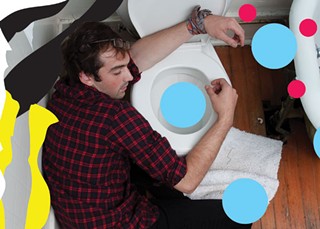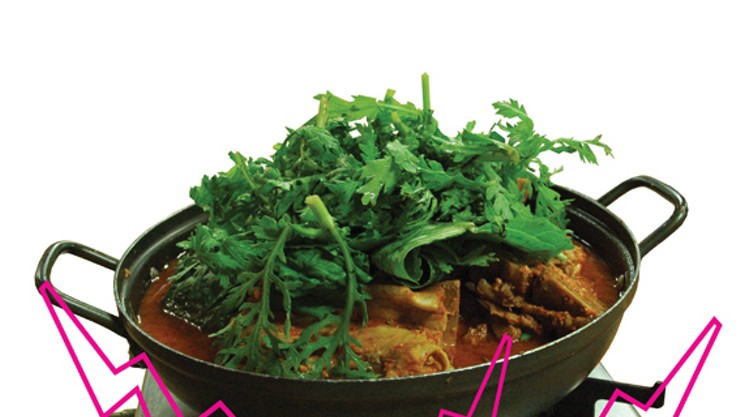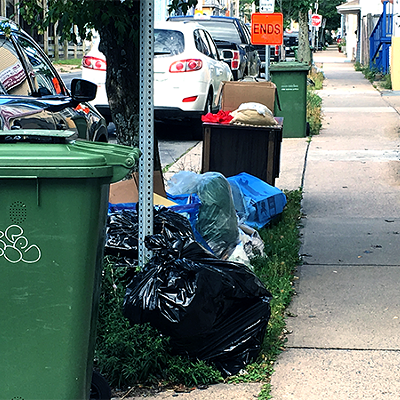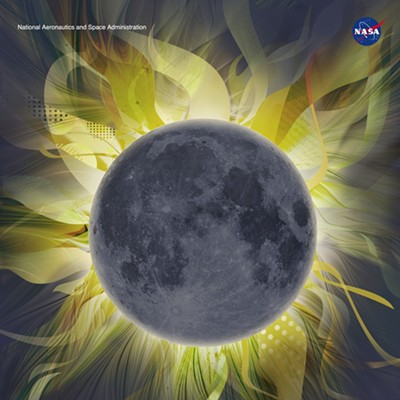One sunny November morning in fourth year I woke up and I could see. For the first time since elementary school I could make out details on the far walls of my room. Before I could begin to understand or enjoy this newfound gift of sight, my brain was clamped in a hot vice and my bowels threatened to blow.
On one of several subsequent trips to the bathroom, I peeled my contact lenses out of my skull and sank into familiar blurriness. As memories of the previous night's Jäger shots, sloppy conversations and post-puking "nap" on the frozen post office lawn flooded back to me, I vowed I would never drink again.
The French term for hangover is "gueule de bois," which means "mouth of wood." In German it's called "kater" or "katzenjammer": "the wailing of the cats." In Italian, it's "malessere," meaning "unease," and in Spanish it's "resaca," meaning "undertow." The Japanese term for hangover is "futsukayoi." I can't figure out what it means, but it's phonetically sympathetic to how sucky you feel.
Whatever you call it, the symptoms of a hangover are universal, and if you drink too much they will find you and make you pay for your indulgences the night before.
Dr. Maria Patriquin describes a hangover as a "constellation of bad symptoms," including headache, dizziness, low blood sugar, stomach upset and fatigue. Other unpleasant side effects include sensitivity to light and sound, difficulty concentrating, poor depth perception, anxiety and remorse. And a general resentment of life and anyone enjoying it in a cheery, non-agonized way.
Hangovers are caused, and their severity determined, by a variety of factors, including what was drunk, the quantity consumed, the speed of consumption, the age, body mass, gender and mood of the consumer, and whether or not s/he ate prior to drinking. Ethnic and genetic factors also come into play, and because of all these variables, hangovers are like snowflakes---no two are exactly alike. Unlike snowflakes, however, hangovers can cause you to vomit on your roommate's crush's shoes, spend the day apologizing to everyone you saw the night before and make you miss classes, work or exams.
The ethanol contained in alcoholic beverages has a number of established effects on the human body. Alcohol is a strong diuretic, and as any frat boy who's worn Depends to a drinking contest can attest, it will make you pee more than usual. According to Kim Porter from the UK's Nutrition Coach, consuming 50ml of alcohol will cause your body to produce 500ml of urine. Frequent urination leads to dehydration, which leads to headache, dry mouth and fatigue.
Alcohol is also a vasodilator and it causes blood vessels---particularly the capillaries near the surface of the skin---to expand. As a result, drunk people often initially feel warm and look flushed (and alcoholics stereotypically have an "enlarged red nose" from permanently dilated blood vessels), but body temperature soon drops as heat is lost to the surrounding air.
This heat loss can be especially dangerous in winter, as it tricks young ladies and gentlemen into thinking it's warm enough to line up outside bars in muscle shirts and mini skirts in -20 degree weather. Expanded blood vessels also cause headache and fatigue and have a detrimental effect on sleep, which explains why after a night of heavy drinking you wake up still exhausted. That, and going to bed at 4am doesn't help.
Alcohol also irritates the esophagus, stomach and intestines, causing inflammation of the stomach lining and increased production of stomach acid. Cue nausea, vomiting, cramps and diarrhea. Hungover people are disgusting.
Another cause of hangovers---argued by some to be worse than the alcohol---are congeners. Congeners are impurities produced in the fermentation process that contribute to the look, smell and taste of different alcoholic beverages. There are more congeners present in dark drinks like whiskey, red wine and dark rum than in clearer, more distilled drinks like vodka, white wine and light rum. There are also more congeners found in cheap wines and spirits than in more expensive varieties.
It is widely accepted that the more congeners in a drink, the worse the resulting hangover. According to a study published in the British Medical Journal and cited widely on the internet, brandy causes the worst hangovers, and vodka the best ("best" being a relative term meaning you might not want to crawl into a cave and die). One possible exception to this rule is Blavod, "the world's first black vodka," which is distilled in the UK and was discontinued on NSLC shelves a few years ago. Coincidentally Blavod, when mixed with soda, turns the exact shade of grey-green death that you feel the next day.
All of this unpleasantness is easily avoided. Don't drink. Or, if you do, drink less than one alcoholic beverage per hour and alternate between booze and water, and definitely don't drink to excess. If you disregard these preventative measures, you may be in for an ugly morning/day/week after, because there is no one-size-fits-all cure for a hangover.
"There are so many different things going on when your body is metabolizing alcohol that to have one cure-all is just not going to happen," says Amanda Hudson, program administrator at Nova Scotia's Addiction Prevention and Treatment Services. "There are so many factors at play. Not only is everyone's biology different, it's different at different points. And throw in myriad other variables like what you've eaten, whether you have a cold, are on drugs, have had lots of exercise, and that's the reason you could drink the same thing on two different nights with very different results."
Patriquin agrees: "There's no real cure, but it intuitively makes sense that you should drink fluids, eat some food and get some sleep." What you eat and drink, however, will depend on which part of the world your sorry self wakes up in. (See the sidebar "A world of hurt" for 15 popular "cures" from countries around the globe.)
If none of these "cures" strike your fancy, the important points to remember are to rehydrate (but stay away from caffeinated, alcoholic and high-sugar drinks like coffee, beer and pop as they'll further dehydrate you), eat something to raise your blood sugar (ideally not a big greasy breakfast, as the fat is hard on your already taxed liver) and get some rest (some people swear by exercise to "sweat it all out," but this can also be very dehydrating).
If you're still feeling miserable and decide to turn to painkillers, be sure not to take anything with acetaminophen/paracetamol (the active ingredient in Tylenol and Excedrin) as it's also hard on your overburdened liver. Opt for ibuprophen (Advil) or aspirin instead, but don't take these on an empty stomach.
Ultimately, time is the only true cure for a hangover, and when it comes to processing the toxins you slurped, shot, sipped and funneled the night before, your liver will take exactly the time it needs.
If you find yourself or any of your friends struggling to cure hangovers on a regular basis (say, Thursday through Sunday), you need to re-think your relationship with alcohol. More than 14 drinks per week for men and 10 for women kill brain and liver cells and can have serious long-term effects, including cancer, stroke, memory loss, weight gain, diabetes, pancreatitis and "man-breasts," according to infoscotland.com.
The short-term effects of drinking are also dangerous, and can be fatal if not spotted and treated immediately. As Nova Scotia's Addiction Services website (addictionservices.ns.ca) proclaims, "The amount of alcohol it takes for you to pass out is dangerously close to the amount it takes to kill you."
Alcohol is a poisonous depressant that slows down body functions including heart rate and breathing. If you encounter anyone with these symptoms, stay with them and call 911:
• The person has passed out and cannot be woken up
• Their skin is cold, clammy and bluish
• Their breathing is slow and irregular
• They've vomited without waking up
• Other potentially dangerous effects include lowered inhibitions and impaired judgment, which can lead drunk people to do things they wouldn't normally do.
Addiction Services lists a number of "yellow flag" moments to help determine if you or someone you know is at risk of developing a problem:
• Drinking to escape stress or feel more confident
• Drinking is the main reason to get together with friends
• Missing work or skipping class because of drinking
• Feeling embarrassed or guilty after drinking
• Trouble remembering what happened after drinking
• Hurting yourself or someone else after drinking
• Having unplanned and/or unprotected sex after drinking
• Throwing up or having a hangover after a night of drinking
• Driving after drinking
If you're worried about someone you know, the best thing you can do is approach them when they're sober, speak to them privately and treat them with respect. As Hudson says, "sometimes simply telling someone you're concerned can have a big impact." For more help, consult professionals at your university's Health Services department or contact Addictions Services directly at 424-8866.
While drinking can be fun, hangovers never are. The trick, like most of life, is to find the balance. So the next time you wake up in a crusty pile on the bathroom floor, instead of vowing off booze forever and sticking to it for three days, try to figure out where you went wrong and learn from your mistakes.
And heed Sid Garner's warning in The Hangover that "What happens in Vegas, stays in Vegas...except herpes. That shit will come back with you." Just substitute "when I'm drunk" with "Vegas," and "everything I did" with "herpes" and you'll be on your way to great nights with less hell to pay in the morning.

















